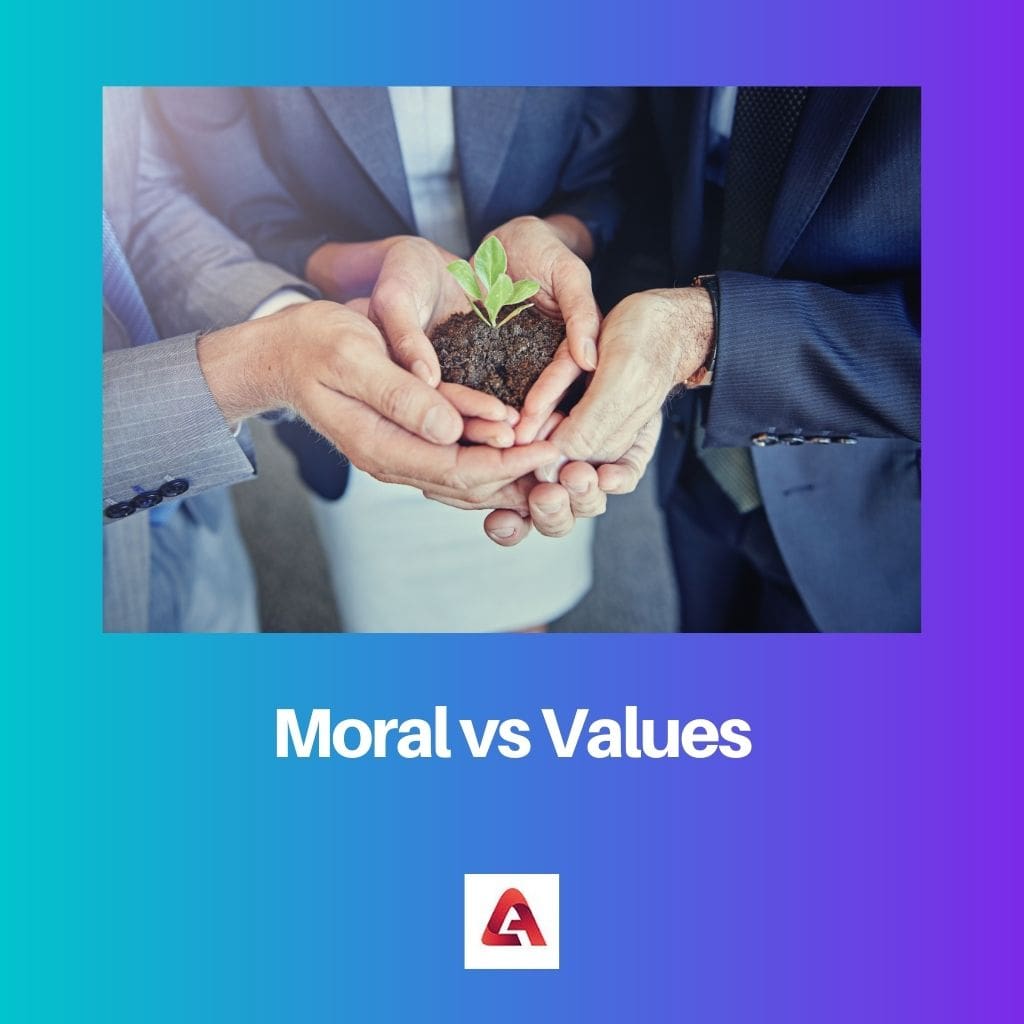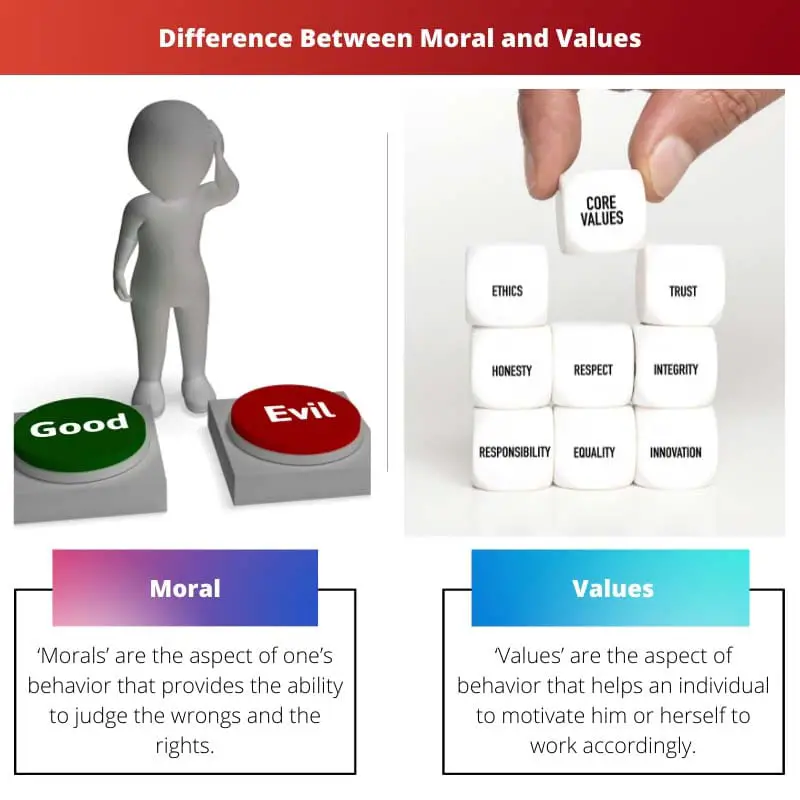‘Morals’ and ‘Values’ are critical behavioral aspects expected from a person. It is said that a person should be morally good and inherit good values.
These two things are naturally deemed necessary in individual behavior. There is no perfect line of differences between the two terms, but the terms vary differently.
Key Takeaways
- Morals are principles or guidelines that govern behavior and help individuals differentiate between right and wrong.
- Values are personal beliefs or priorities that guide decision-making and shape an individual’s perception of what is important in life.
- Both morals and values influence behavior and decision-making, but morals focus more on ethical conduct, while values encompass broader life priorities.
Moral vs. Values
The difference between Morals and Values is that ‘Morals’ are the learned characteristics of any individual under the influence of society and surroundings, whereas ‘Values’ are the principles inherent in an individual and motivate them to work better.

‘Morals’ are the standards of an individual’s behavior or principle of beliefs to judge what is right and wrong. These are developed and later governed as per societal expectations.
‘Values,’ on the other hand, is the learned belief system where an individual motivates themself to do several things. ‘Values’ are inherent qualities that are not learned by the influence of society.
Comparison Table
| Parameters of Comparison | ‘Morals’ | ‘Values’ |
|---|---|---|
| Definition | ‘Morals’ are the aspect of one’s behavior that provides the ability to judge the wrongs and the rights. | ‘Values’ are the aspect of behavior that helps an individual to motivate him or herself to work accordingly. |
| Characteristic | ‘Morals’ help an individual gain social acceptance and importance. | ‘Values’ are like intuitions that may or may not help an individual to gain importance and social acceptance. |
| Expression | ‘Morals’ are seen as statements and general rules. | ‘Values’ are expressed in varied forms; therefore, their expression is abstract. |
| Influenced by | They are influenced and overpowered by several factors such as religion, society, work culture, etc. | These are inherent, and no significant factors influence them. They are solely dependent on an individual’s behavior. |
| Prone to change | ‘Morals’ are primarily affected by the surroundings and prone to change once the surroundings of any individual change. | ‘Values’ are inherent and tend to remain the same for a more extended period in an individual’s life. |
What are Morals?
‘Morals’ are the behavioral aspect of any individual that enables him to judge the wrongs and rights around him. These characteristics are essential for any individual to get social acceptance and importance.
To become a loved person, it is said that the person should be ‘morally good.’ They are influenced by society, workplace, surroundings, religion, etc., and are prone to change once the person’s environment changes.
‘Morals’ are the set of rules, principles, and statements an individual should follow to gain a ‘good’ status in society. Some of the good morals that an individual should follow are as follows:
- One should respect their elders.
- Any person should not cheat.
- To always tell the truth.
- To respect religion
‘Morals’ can also be called the societal guidelines where people are expected to sacrifice their interests for the more significant benefits of society and their surroundings.

What are Values?
‘Values’ are the set of principles that an individual inherits right from a very early age. These values help that individual to motivate him/herself to achieve larger targets for personal benefits.
These can also be called intuitions because, most of the time, they are not influenced by society or other factors.
Individuals are predisposed to accept some values because they believe in them. Values can be of different types. Some of them come intrinsically such as love, freedom, truth, etc., whereas others are related to the larger narrative of self-interest, such as ambition, courage, responsibility, etc.
Some of the widely known good values of individuals are as follows:
- Love animals.
- Respect your family.
- Be financially secure and dependable.
- Aim high and work hard for your dream.

Main Differences Between Moral and Values
- ‘Morals’ are the set of principles and statements widely accepted by an individual’s society, whereas ‘Values’ are the principles that an individual inherits and help to help to motivate self to work better.
- ‘Morals’ are primarily influenced by many factors such as religion, environment, society, culture, etc., whereas ‘values’ are inherent and work towards a person’s self-development.
- ‘Morals’ change with time because of changes in society and environment, whereas ‘Values’ of an individual tend to remain the same for a long time.
- To have a good status in society, a person should possess good ‘morals,’ whereas to decide for self, the person should have good ‘values.’
- ‘Values’ are like intuitions and are abstract to express, whereas ‘Morals’ are expressed as the understood rules and norms.

The article combines facts with a scholarly approach. It’s indeed a valuable addition to this topic.
I couldn’t agree more. It’s a comprehensive study on morals and values.
The depth offered in this article is remarkable.
The article is a terrific explanation of morals and values. I love how it points out the main differences between them.
I couldn’t agree more! It’s a great article.
This article offers a compelling perspective on morals and values. I appreciate the in-depth comparison provided.
I completely agree. It stays factual and elaborate.
I’m glad it’s providing information and value.
This article makes a strong case for the significance of moral values. It’s a commendable work.
Absolutely, the article provides a comprehensive understanding.
This article is enlightening and well-researched. It’s a commendable piece for explaining the key differences between morals and values.
Absolutely! I appreciate how the article thoroughly explores both concepts.
The in-depth analysis and explanation are impressive indeed.
The detailed comparison is quite thought-provoking. It’s a great read, especially for anyone wanting to understand this topic better.
The article provides much-needed insight into morals and values.
I couldn’t agree more. It’s exceptionally well-elaborated.
This article is not only informative but also thought-provoking. A valuable read for anyone interested in ethics.
I find the cross-comparison of morals and values really compelling.
A very informative piece. The article certainly fulfills its purpose of educating on this matter.
The detailed analysis offers much to think about.
The distinction between morals and values is clearly explained in the article. It’s both educational and engaging.
Absolutely, the depth of information is praiseworthy.
The article presents the subject matter in a truly engaging style.
A well-articulated piece that manages to make its point effectively. I find it quite insightful.
I’m pleasantly surprised by the depth and detail provided.
There’s no denying the quality and depth of this article.